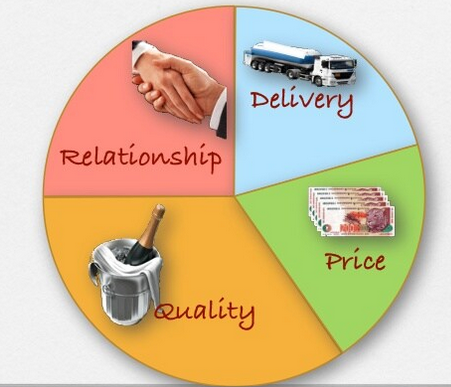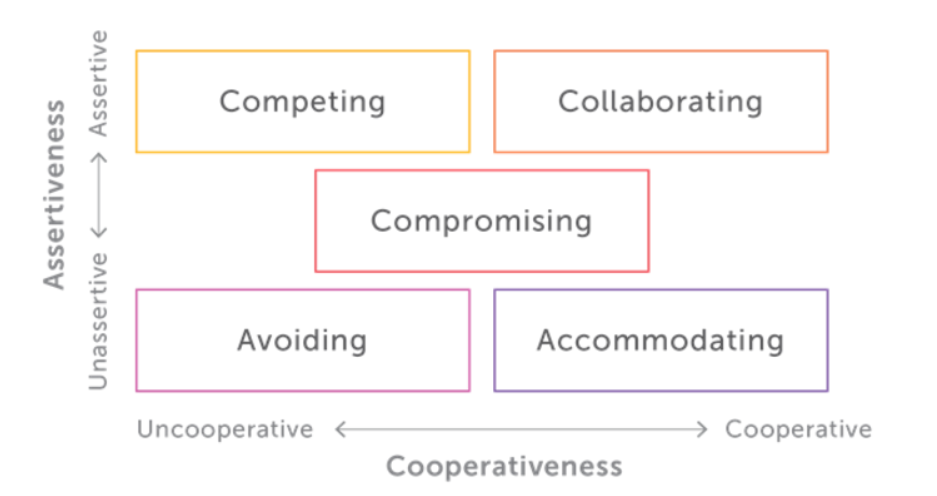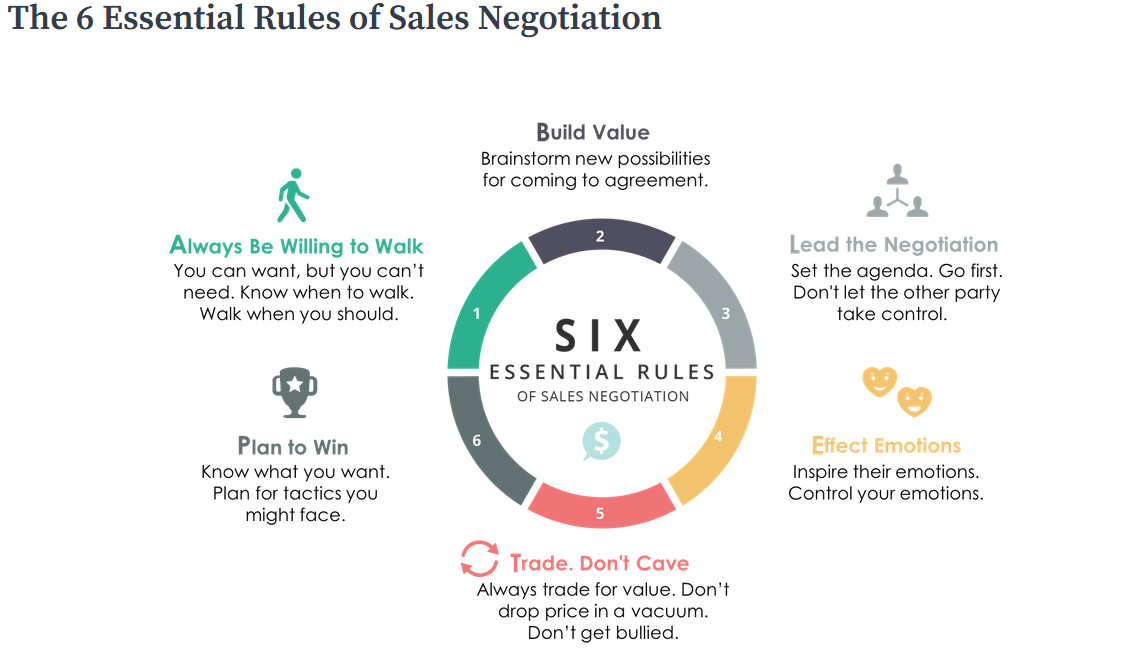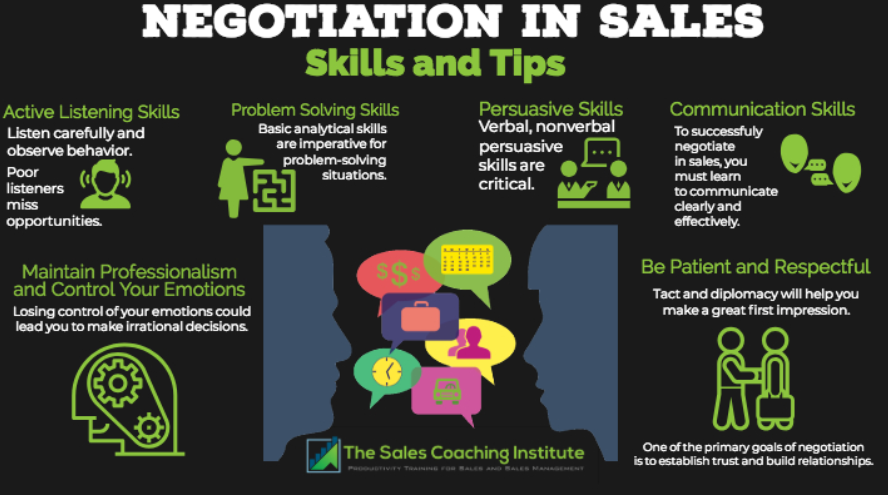The sales negotiation can be a minefield for some businesses, don't trip yourself up. It takes skill to win in any sales negotiation. These strategies will arm you with the tools and knowledge to get you there and be a better negotiator than anyone else in your field. Now we will share insights on how to get started with Sales Negotiation Training, Skills, and Strategies.

Whether you're new or experienced at sales negotiation, effective techniques can lead to higher profits and more extensive commission checks. The particular skills and strategies that work for individual salespeople vary widely, as do their attitudes toward sales negotiating.
This article will discuss how to negotiate successfully to get what you want from your customers while making them happy. Here's an overview of the topics
- What is the sales negotiation training?
- The five-step sales negotiation strategy
- Know your goal and understand the buying process for sales negotiation
- Start with a clear understanding of what you want to achieve from sales negotiation
- How to read your counterpart's body language for sales negotiation
- How to ask questions to find out precisely what your clients want in sales negotiation
- Different Types of Sales Negotiation
- Dealing with Competitive Sales Negotiation Challenges
- Understand the benefits of Sales Negotiation
- Skills required in Sales Negotiation
What is the sales negotiation training?
A sales negotiation is not a haggle or a game of bluff. It's two people trying to decide whether to do business with each other. The purpose of the sales negotiation is not to get the lowest price possible, nor even reach an agreement, but to decide whether the terms are good enough for both parties to proceed. If your goal is to get the lowest price, you will probably succeed, but you will miss many opportunities.

Source: Sales Negotiation Training Elements
Sales negotiations are similar to chess matches in that there is no element of chance; the players' skill and strategy determine all outcomes. Of course, like chess, the game of sales negotiation has an aspect of human psychology that cannot be quantified nor controlled.
The five-step sales negotiation strategy
The standard view of sales negotiation is that it's a process of getting the other side to accept your position. But this isn't accurate because it implies that both sides have fixed positions and one side has to give in. That may happen sometimes, but more often, neither side has a fixed position, and both sides are trying to create an agreement that will make both sides better off in a sales negotiation.
You can think of sales negotiation as a sales process. You are not trying to convince the other side to do something they don't want to do; you are trying to present them with something they want even more than they like what they are currently doing. Here is a five-step strategy for how to do that:
- Clarify what you want. Start with something that seems attractive and straightforward, then refine it into something more prosperous and more detailed in a sales negotiation
- Explain what the other side is doing now, so you understand where they are coming from. Then explain why the sales negotiation and what you have to offer will be better for them
- Outline the risks of sticking with what they are doing now versus making a change, so you understand why they might or might not be interested in creating a change for a sales negotiation
- Listen carefully to their concerns, objections, questions, etc., so you can counter accordingly with valid points and instances. Hence, you assume goodwill on both sides in a sales negotiation
- Close the deal by asking for the order at the right time in the right way. In this step, you follow up, clarify and confirm to get towards purchasing the item/service in a sales negotiation
You can use this strategy for any sales negotiation situation in which you have a clear idea of what your standards are and what your bottom line is. You can start from different places depending on your information about the other person's standards or bottom line.
Know your goal and understand the buying process of sales negotiation
When a buyer and a seller negotiate in a business setting, they should both have the same plan -- to agree on the terms of a sale or purchase. However, understanding the other party's goals can improve your sales negotiation skills because it helps you know what they are likely to agree to if you ask for certain concessions.

Source: Sales Negotiation Strategy
The first step is to find out what your customer needs to know about the product or service that you are selling. You can do this by asking questions during the sales negotiation. You can also have someone ask the customer how he would rate each issue on a scale of 1 to 10.
By giving your customer options, you allow him to choose which comments are most important to him. You can then use his ratings to determine what concessions you make to meet his needs during the sales negotiation. For example, if he rates the price as a ten and delivery times as a 2, you will know that he wants lower costs and faster delivery times. Giving him these things may require that you extend payment terms or allow him access to your products before paying for them.
Start with a clear understanding of what you want to achieve from sales negotiation
The sales negotiation process should have a clearly defined objective. Every sales negotiation has the potential to be a win-win situation. It is neither a win or lose proposition. Of course, it would be wonderful if your customers view the sales negotiation as a win-win situation, and you can walk away from the deal feeling that you have met your organization's goals. However, this is not always going to be the case for a sales negotiation.
The first thing to understand is that there are two sides to every transaction n a sales negotiation. Both parties want to get the best deal possible whilst simultaneously appearing to give away as little as possible. The critical thing is that both parties should walk away feeling that they have got a good deal in a sales negotiation.
Another essential thing to remember is that the buyer will only buy when they need your product or service. This means that before you even start any sales negotiation, you need to have done your homework on who your customer is. You need to know their budget, needs, and hot buttons and how much resistance there may be from senior management, which may be overriding the decision-making process in a sales negotiation.
How to read your counterpart's body language for sales negotiation?
There are a lot of things going on in a sales negotiation. If you're not watching for them, you could end up walking away from the table with an agreement that your counterpart won't honor in a sales negotiation.
The first thing to look for is your counterpart's body language. How does she stand? Is she leaning toward or away from you? Is she sitting back or leaning forward? These are all signs of how engaged your counterpart is in the conversation of a sales negotiation.
What about her arms and legs? Are they folded or open? Folded arms indicate a guarded posture – someone less likely to be receptive to what you have to say – while open arms suggest a more welcoming attitude.
One sign of engagement in a sales negotiation is how much your counterpart is moving. People who fidget, tap their fingers, move their feet, cross and uncross their legs, play with objects on the table or run their hands through their hair are all demonstrating that they have an internal "dialogue" going on – that they are engaged in processing information and giving it more profound thought.
If your counterpart is standing still with his hands behind his back, he may be sending the message that he is closed off to the deal and so forth.
Most people's body language is directly related to their emotional state in the sales negotiation. If your counterpart seems agitated, it might be because they are uncomfortable with the sales negotiation process or they don't like you, or any number of other reasons.
How to ask questions to find out precisely what your clients want in sales negotiation?
Every salesperson knows that there is far more money to be made in selling customized solutions than in selling off-the-shelf products. But it's hard to sell something with no standard features or even with too many options.
The trick is to find out what your clients need and then use that information to structure an offer rather than a list of features.

Source: Sales Negotiation
Sales negotiation is about asking questions - but not just any questions. That's because you need to ask the right questions at the right time, and not all questions are created equal. What you ask can make or break the deal, so it's essential to understand the difference between good and wrong questions in a sales negotiation.
Asking the right question at the right time in sales negotiation means knowing what you want to learn from each client before you start working on their project. Some clients will need very different information than others so that they will need very different types of questions asked of them.
And since most salespeople go into every sale call without a clear sense of what they're looking for, they end up asking way too many vague questions and missing their ample opportunity to help their clients succeed by selling them just what they need.
Different Types of Sales Negotiation
How often have you gone to buy something, and the price on the tag is not what you expected? You may have just negotiated a deal that probably worked to your advantage.
You negotiate every day, whether asking for a raise, buying a car, or getting someone else to do chores around the home. But did you know there are different types of sales negotiation?
Sales negotiation can be divided into two types: distributive and integrative.
Distributive sales negotiation is when you're out to get all you can, while integrative is when you're willing to give something up in the process.
Sometimes it is easier to start with an integrative sale negotiation approach, then move on to distributive sales negotiation if necessary. For example, if you want to buy a car, you might ask about financing options first. The salesperson will be more willing to work with you if they feel like they did not lose anything in the deal.
Dealing with Competitive Sales Negotiation Challenges
Sales Negotiation Skills and Strategies can be learned and implemented into your daily work routine. They will help you become more effective and better equipped to secure the best possible deals for yourself and your company. By learning how to negotiate, you develop confidence in your ability to do business with anyone and increase your value to your employers.

Source: Sales Negotiation
How do you deal with the competitive sales negotiation challenges? Here are seven tips:
- Get to know your counterpart
- Know your customer, the competition, and the market
- Focus on value and not price
- Understand and use your company's pricing decision process (PDP)
- Determine and use your customer's PDP
- Define and communicate reasons for price increases
- Set price targets and pricing guidelines
Understand the benefits of Sales Negotiation
Sales negotiation is an integral business activity that provides a platform for the sellers to barter, bargain, negotiate and strike deals with prospective buyers.
The sales negotiation can be a legitimate and effective way to increase sales.
The following are the benefits of sales negotiation:
- Sales Negotiation creates a win-win situation for both parties
- Sales Negotiation reduces your costs by eliminating the need to negotiate with many customers
- Sales Negotiation gives you more time to focus on selling instead of negotiating
- You get better deals because you are talking directly with the decision-maker who has the authority to make an offer
- Sales Negotiation is an art that enables you to know what, when, why, how, and where to negotiate effectively to get an improved deal or terms of sale
- You can get better deals on all aspects of doing business with your customers for a sales negotiation, including discounts, orders, payments, delivery times, and service agreements
- Sales Negotiation helps build strong relationships with your customers while minimizing conflict and disagreements
Skills required in Sales Negotiation
It's one thing to be able to come up with a list of benefits for a client. It's another to be able to work through the sales negotiation process and get them all in. This is where sales skills come in. The sales negotiator has to have many skills to get the best possible deal for his client.

Source: Sales Negotiation Skills
Some of these skills include:
1) The ability to find out what the client wants and why they want it
2) The ability to find out what the other party wants and how important it is to them
3) Having the persistence and patience needed when either party says "no" or tries to move you away from your position in a sales negotiation
4) The ability to read people effectively (both verbally and non-verbally) so that you can understand what they mean
5) The ability to recognize when you need help and when it might be better not to ask for help in a sales negotiation
6) Being able to recognize when you should walk away from the deal
7) The ability to follow up effectively if you decide not to walk away from the deal in a sales negotiation
How Deskera Can Assist You?
Whether you are a sales manager or running your own business, there are tons of duties and responsibilities that you have to fulfill. Using the Deskera CRM system, you can manage your contacts, leads and sales deals. You can use the CRM system to manage all customer data and manage your leads, sales negotiations and deals.
Doing so will help you to save the time taken in transferring customer data between the different systems. Having a good CRM system will help you manage your financial and sales reports and be prepared to kick-off your meetings.
Deskera can also assist you with real-time updates about your business like cash flow status, customer satisfaction, inventory management, sales, purchases, purchase orders, customer tickets, customer satisfaction, managing leads, revenues, profit, and loss statements, and balance sheets.
Moreover, it would also help in integrating sales methodology across different platforms onto one system so that you have a consolidated list for email campaigns, leads management, and sales pipeline to mention a few.
It will also help you to sync between your orders, payments, taxes, refunds, product variants, sending out invoices and reminders, facilitating invoice management, and even undertaking follow-ups and advertisement campaigns.
Such a consolidated platform will help you to improve your sales through building effective sales compensation plans and also facilitate faster and well-informed decision-making. It will help you in strengthening your opportunities and being braced for the threats.
Deskera books and Deskera CRM will also be able to ensure the highest customer satisfaction and thereby an increase in net revenues and net profits.
Wrapping Up
A sales negotiation is not a battle; it is a discussion. You want to work with your client to develop a plan that works best for them and you. You should try to make sure that the sales negotiation you agree on will work out for both parties, rather than just focusing on what is best for one side or the other.
Key Takeaways
Sales Negotiation is a win-win process. It is a process and not an event, and hence it provides room for both parties to get something out of it. A skilled negotiator can make money even if they do not close the deal because the more positive they leave on their counterpart, the better chances they will get in future sales negotiations.
Sales Negotiation is an art form with its own set of skills and techniques which can be learned and honed through practice and perseverance.
The sales negotiation strategy may be summarized as follows:
- Find out what the customer needs, even if it requires some research on your part
- Ask questions to clarify what the customer wants, and if possible, why he wants it
- Offer a solution that meets the customer's needs better than anything else he has considered, but at a price that is fair to you
- Ask for the order
- Deliver what you promised on time, or early
At Deskera, we give you several reasons why you should spend the time to become great at negotiating your deals with our easy to use CRM system. Sales Negotiation is not just about getting a better price- it's about getting the best terms, conditions, and terms of payment. This means that when you are selling, you are selling your product and how it is delivered.
Related Articles













